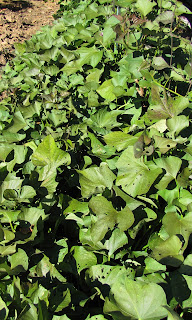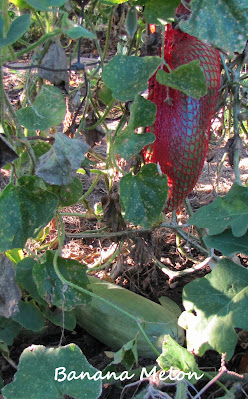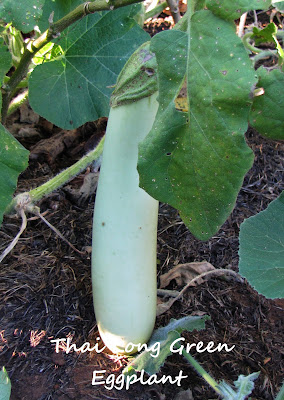The war rages on. Word has spread far and wide that my garden is a free-for-the-taking candy store and every pestilence imaginable has arrived to wreak havoc. There have been casualties on both sides, too many for me to recall. It is not waning but has accelerated. This week the enemy brought out the big guns - a rabies-carrying, cricket-stealing, nighttime bandit, skunk digging machine.
My brother saw the picture and claimed it is a cute, adorable kitten. (He is a cat person.) I vehemently disagreed since I can smell the difference from the porch. (I confess to accidentally trapping the neighbor's cat who now hates me and refuses to catch any of my mice - the cat not the neighbor). I told my brother if he would agree to get a rabies shot I could ship it to him. He hasn't responded.
Such an adorable face.
The good news is that most of the garden has survived the onslaught of destruction due to my daily replanting of the damaged spots so the final fall ingathering is in full swing. All must be completed before the first frost which is scheduled to appear around October 15th. Summer vegetables remaining are Lima beans, Dixie Butterpeas, green beans, peppers, sweet potatoes, cucumbers, banana melons, wax melon, bitter melons, eggplants, okra, winter squash, one or two tomatoes, and various herbs.
First, the Lima beans will be picked, shelled, and frozen for winter meals. Never have I grown Lima beans this prolifically. They have always been in the shady part of the garden but since they now receive full sunshine and horse manure, they have covered over the dead Orange Icicle tomato plants and the pathway arch. The sweet potatoes beneath have joined the beans on the support fence.
The second row of Lima beans gets less sunshine and so has been easier to contain. Due to constant trimming, it is still possible to bend down and walk through the arch.
The enormous growth has shocked me because each side of every arch has only about three plants.

This past spring the seed companies were sold out of Lima Beans and there were only about twenty saved in my collection. Everything was planted in hopes something, anything would sprout. Underneath the leaves, they are covered in pods. I am overjoyed.
Next, the Dixie Speckled Butterpeas will be harvested. When my fingers get sore from so much shelling, I fill up large bowls full of bean pods and sit them in every chair. No one (company included) is allowed to sit down unless they shell beans. Anyone removing a bowl to only rest receives glaring looks from me as I slave away over my large bucketful of bean pods.
Not everything has been a success. For two years now, the Fordhook Lima beans have not matured. Last year's failure was attributed to being planted late but this year they went out earlier. Either way, they don't seem to be able to produce beans before frost. Their pods are still flat. They will be ripped up and thrown in the compost pile for the horses to make off with over the fence.
Peppers are very frost sensitive and are next on the list. Their branches have begun breaking because they are laden with much fruit. Depending on the variety, some will be pickled, others frozen, or dehydrated for seasonings.
Winter squash will not store through the winter if they freeze. They need to be washed and set on the front porch to dry where they can be whisked into the house at the first sign of a cold snap. I peeked under the leaves and was disappointed because there doesn't appear to be many. This chore will be done as the frost clouds are rolling in to give anything left as much time as possible to fully mature.
Sweet potato vines turn black after the first cold night but the potatoes underground can survive a few days. Being under the massive Lima Bean fence will make this chore challenging. However, it was wasted space below the tomatoes and so became an extra row available for planting. First, the beans must be picked, the vines pulled away, the strings that attached the tomato vines to the fence snipped, and those vines removed. The arch over the walkway must be unwired, the fence unhooked from the posts, and pulled out. Everything must be rolled up and stored behind the shed area which needs to be sorted and weeded. The sweet potato vines will be removed so digging can start. Lastly, the potatoes will be washed and cured on the front porch before being stored in boxes for the winter.
The various green beans will continue to produce until a hard frost kills them. As the days shorten and the sunlight lessens, they slow down. They are stored in the refrigerator until there is enough for a canning session.
Maxibel Green Beans have been a huge surprise. They were planted in the spring, became covered with small pods, then stopped when the blisteringly hot summer weather arrived. They never recovered and were ripped up.
About six weeks ago I threw the seeds in the ground to keep from dumping them in the compost. They grew rapidly and are covered in beans!
Nine okra plants managed to survive my many mistakes and made it to the finish line. It was enough but more would have been better. They are so tall I have to bend them over to reach the highest pods. The last couple of cool nights have slowed them down so they will stop producing soon. Until then, the pods are being battered and frozen or dehydrated for soups. A few have been pickled.
The wax melon has finally grown a melon. It is supposed to be as big as a watermelon, not the size of a cucumber. This is not living up to the seed catalog hype. However, it has a few more weeks to go so maybe it will make it. Maybe?
Whenever an empty spot becomes available, a seed has been dropped in. This cucumber just started producing a few days ago but it is welcomed since the others are almost finished.
A Banana Melon seed was tossed in the empty spot left open after the Purple Russian tomatoes died. It has grown up the fence so the melons must be supported with a net. Whether it will ripen before cold weather is unknown but it was worth risking a seed for the chance of a vine-ripened melon out of season.
The odd assorted bits are gathered and canned into either leftover surprise soup, jars of mixed vegetables, or chopped and put into fresh salads. Nothing is wasted.
Work on the winter garden is progressing. I'm holding off planting seedlings until the war is won. In the spring it is easy to recover if something is destroyed but there is no reseeding in the snow. It took eight plantings of seeds purchased from three different companies to get this row of beets to survive. It feels like winter will arrive early this year and I am trying to get ready.
































